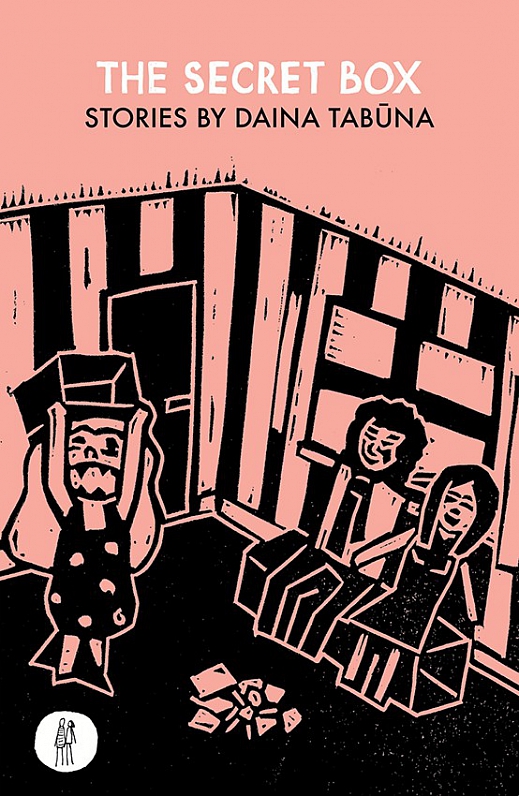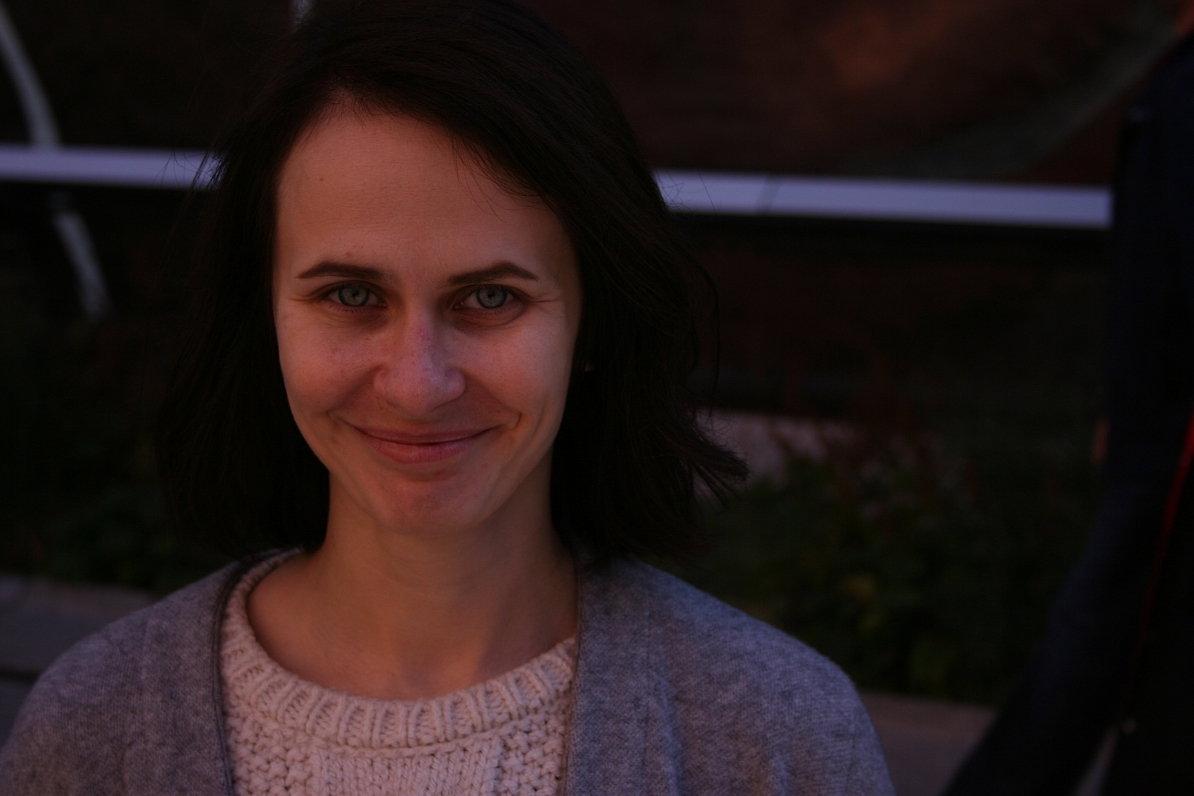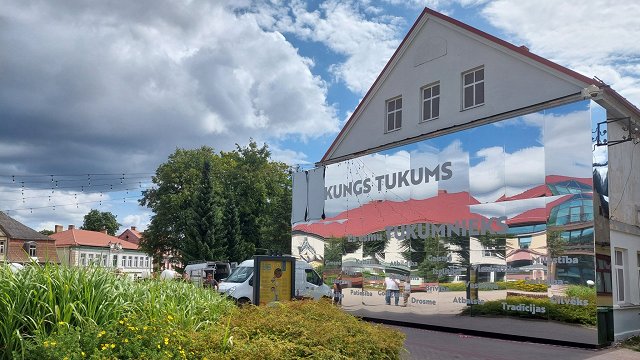The stories are illustrated, but they are definitely not just for teens. They charm with sincerity and openness, and in them seemingly everyday things like child's play and aimless walks around the town acquire such meanings that return our daily lives their true weight.
LSM asked Daina a couple of questions about this fortunate event.
How did you come to cooperate with The Emma Press? How did you pick the stories?
Daina: The Emma Press is one of the British publishing houses that visited Riga to find out more about Latvian literature and the country's publishing industry. These events were organized by the Latvian Literature platform. After reading the translation of my story The Secret Box, Emma Wright - who heads the publishing house - offered me to publish three stories within their pamphlet series.
The translator Jade Will chose the stories, judging both by aesthetic criteria and the desired volume. Emma herself edited the translations. I'm very glad about how it worked out with The Emma Press. I felt that their representatives were truly interested and supportive.

How do you like the illustrations and the translation?
The publisher offered me to choose from a number of artists, and Mark Andrew Webber's style seemed the most appropriate. It's visually pleasing, but not too sugary; ironic, but not aggressive. Of course, it was hard to picture the way Mark would click with my stories, as I did not know him, but I think the result is wonderful. I like the design and Mark's drawings very much! It may yet turn out that I want illustrations for my next books as well.
It was important to Jade for me to be satisfied with the translation, so we led an active correspondence, and met several times to talk over some subtleties.
"We hated this reality and knew how to escape it," says the protagonist of the title story. You could say that the characters of all three of these stories are confronted with a 'bad reality' - and a woman's reality at that, which does not give one any extra privilege. However, instead of speaking out against things like gender roles you simply illustrate, with tenderness and understanding, how women and men too face different limitations. Is part of growing up being able to accept your situation?
I wouldn't agree that the heroines of my stories live in a 'bad reality'. My aim was to write about people coming from ordinary families, people whose lives aren't marked by cataclysms or any extraordinary tragedies, but who nevertheless have a difficult, confusing and sometimes painful time growing up. It's because of the current gender roles, and also other limiting preconceptions.
In their own characteristic ways my characters wage personal, often very private war against these limitations, making their first steps to take responsibility for their own lives, and growing up in the process.
However, to me, a not less important part of growing up seems to be understanding that you're not the only one who has to suffer, and that other people in your life are fighting their battles of their own that seem just as difficult and important to them.
Your characters are often passive. You've said elsewhere that women, especially those the age of your protagonists, often simply don't have much room for maneuver. It may have made writing the stories more complex, as there fewer remained believable ways for your characters to surmount their difficulties. Do you remember how you solved it?
I guess passivity and submission, and adjusting to others - often expected or requested of children, but of girls particularly and women later in life - is the main difficulty that my characters have to overcome.
I was interested in writing about the small moments of breakthrough - that may seem like small events from the side, but they serve as important turning events in their personal biographies. It may be stepping off a tram at a station where you've never been, throwing away your childhood toys or making a long delayed phone call.
The short story form seemed appropriate for this goal. If I had chosen to turn one of the stories into a novel, maybe I'd have had to make the characters more active and make the central events weightier.
It could be said that your style goes against a part of 90s and 2000s Latvian prose which deals with the Great Topics, often in complex narrative and using poetic language. Was that a conscious choice?
I think that my topics - like the development of personality, constructing reality through narrative, etc. - are also big enough. However, I did want to approach them with as simple, intimate narrative as possible, sprinkled with self-deprecating humor.
I enjoy language being used masterfully, but it annoys me if the author tries masking a surface thought with poetic decoration or experiments of form.
You were getting published when you were very young, at the age of 14 or 15. How did you fit in with much older writers? There was also a pause when you did not really publish anything. What happened?
I did not strive to fit in with older writers. More important was the friendship and correspondence with other young people--most of them were however poets not prose writers--whom I met at the Aicinājums literary camp, the Young Author Seminar and other literary events.
As a teenager I was, of course, moved and flattered to be published alongside experienced and recognized authors. However, honestly I had not read much of their work, and I did not have a real understanding oh what that means. I was also sufficiently self-critical, and realized that I'm still a beginner and that these opportunities are presented to me because of my potential, rather than actual achievements.
It's true I did not publish anything at one point for several years. Even though I was thinking about writing all the time, I was unable to finish anything. It can be attributed to the trauma drama studies left on me, and the process that could be called looking for my own voice.
What were these traumas?
My bachelor studies helped me realize how I don't want to write. But they did not, sadly, help me understand how I actually want to write, so that others and, most importantly, me myself would have liked it (or wouldn't hate it).
I thought about writing stories for years but when I sat down to a blank MS Word document it caused me something close to nausea.
Since then I have learned several ways of dealing with these emotions, but I cannot say they have disappeared completely. It is a bit embarrassing to say this, as it might sound that this is not the right vocation for me. But nothing else gives me as much satisfaction.
Your supposedly quotidian but polished stories remind me of Regīna Ezera's writings. Where would you place yourself within the Latvian literary tradition?
Of course, there are Latvian works and authors dear to me. At one point I read the "young and angry female writers" and was greatly excited. They're sometimes named when people talk about Pirmā reize. Some time ago I was very excited about The Wonderful Youth of Bille by Vizma Belševica. While the poet and critic Anna Auziņa mentioned the New Sincerity movement tied to Jānis Joņevs Jelgava '94 and, in my opinion, Kristīne Želve's The Girl Who Cut My Hair. Both of these works made me happy.
But I could not call any Latvian author to be my teacher or model. I was spurred to writing not by a desire to cultivate a tradition, but rather by my intuition, an almost indescribable feeling that there's something amiss within Latvian literature.
Two million people speak Latvian. What could such a small culture give to the world, if it's a valid question at all?
I think it's like asking, within the context of preserving the variety of species, of what a certain plant or animal can give to the world.
Being unique, singular, and authentic is valuable in of itself. These values don't have to prove themselves or sell themselves.
You currently live in the state of New York with your husband, the journalist and poet Ivars Šteinbergs. What are you two doing? You've also mentioned tentative plans about a novel.
Yes, I've come here with Ivars who was granted a Fulbright scholarship and studies comparative literature. I hope to get to my second book, but it's currently in a fragile, early state and does not want to be talked about loudly.
What are you reading at the moment?
I'm reading Stacy Schiff's The Witches about the Salem witch trials in 1692.
Read more about The Secret Box and order it at the Emma Press website.



























